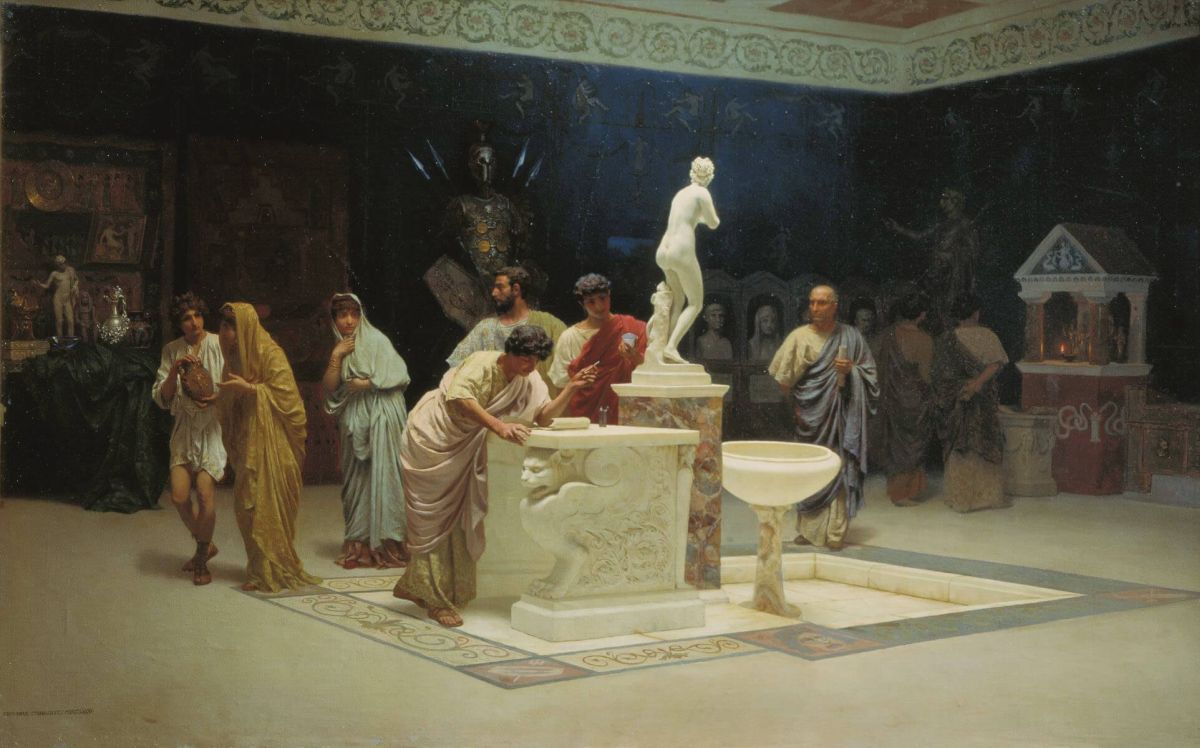Chapters
Gaius Cilnius Maecenas was born around 70 BCE. The exact date of birth is unknown, but it is definitely between 73 and 63 BCE. Roman politicians counsellor and friend Octavian Augustus, poet and patron of poets, including Virgil, Horace and Propertius. His name became the name of the protector of art and science.
He was a descendant of an Etruscan family, as evidenced by the family name Cilnius, adopted by the Etruscan custom after his mother and the Etruscan ending –as (Maecenas). His family roots were to reach as far as king Porsenna. His family belonged to the status of equites. Maecenas obtained a thorough education in Greek and Roman literature.
He accumulated a large fortune, both inherited from his ancestors and acquired thanks to the generosity of August. For this reason, he probably gave up a typical Roman career as a civil servant, because due to belonging to the state of equites he could not achieve the dignity reserved for the senatorial state, and his property and influence predestined him.
All his life he was a friend and adviser to Octavian Augustus. During the assassination attempt on Caesar’s life, he stayed with Octavian in Apolonia, perhaps as the head of the university. Around 40 BCE he acted to capitalize on the defender of the rules of the republic Sextus Pompey for the Octavian party. This led to Octavian’s marriage to Pompey’s cousin – Scribonia. At the same time, he led the covenant of Octavian with Mark Antony at Brundyzjum (Brindisi), ending armed fighting and sealed by the marriage of Antony with Octavian’s sister – Octavia. Octavian confirmed his trust in Maecenas, entrusting him with the management of Rome and Italy during his battles with Sextus Pompey in 36 BCE and the final hearing with Antony in the east and in Egypt in 31 years.
Maecenas strengthened his position by frustrating the plot for the life of Octavian returning to Rome from Egypt. At the same time, he managed to prevent bloody proscriptions that were typical of the struggle to control the Empire, which won him the opinion of a gentle and humane person. Although he did not hold any official position, he effectively competed with Marcus Agrippa. The political significance of Maecenas weakened considerably after 23 BCE. He found himself in a conflict of conscience between Octavian and his wife’s family, Terentia. Her adoptive brother, Varro Murena planned a plot and murder of Octavian Augustus. The plot was discovered, and a lawyer warned his brother-in-law through his wife about the danger. This did not prevent the execution of the sentence, but it resulted in Maecenas being completely removed from state affairs in favour of Marcus Agrippa. However, able to separate politics from personal matters, Augustus maintained friendly relations with Maecenas until his death. He retired from political life in 18 BCE.
How the silhouette of Maecenas is presented by ancient authors. Paterculus, a Roman historian (19 BCE – 31 CE) describes him as follows:
While Caesar was engaged in giving the finishing touch to the war at Actium and Alexandria, Marcus Lepidus, a young man whose good looks exceeded his prudence — son of the Lepidus who had been one of the triumvirs for the re-establishment of order in the state and of Junia the sister of Brutus — had formed plans for the assassination of Caesar as soon as he should return to the city. The guards of the city were at that time under the charge of Gaius Maecenas, of equestrian rank, but none the less of illustrious lineage, a man who was literally sleepless when occasion demanded, and quick to foresee what was to be done and skilful in doing it, but when any relaxation was allowed him from business cares would almost outdo a woman in giving himself up to indolence and soft luxury. He was not less loved by Caesar than Agrippa, though he had fewer honours heaped upon him, since he lived thoroughly content with the narrow stripe of the equestrian order. He might have achieved a position no less high than Agrippa, but had not the same ambition for it. Quietly and carefully concealing his activity he unearthed the plans of the hot-headed youth, and by crushing Lepidus with wonderful swiftness and without causing disturbance to either men or things he extinguished the portentous beginnings of a new and reviving civil war. Lepidus himself paid the penalty for his ill-advised plot.
– Velleius Paterculus, Roman history, 88
Art patron
He used his large property to generously support his contemporary artists. As a supporter of the new system introduced by Octavian Augustus, he tried to influence the creators to use their talents in the interest of the emerging system of power. This goal was guided by Virgil, inspired by Maecenas Georgics, promoting Octavian’s return to the ancient Roman values of rural life. So he was the patron of political patronage. He also supported Horace and Sextus Propertius. He gathered a group of writers around him, saving no money both for them and for leading a fairly outdated and fun lifestyle. He was criticized for this by Seneca. He also wrote poems and wrote prose. Few fragments have survived to this day. However, they were not songs, especially prose, of the highest flight. Octavian Augustus critically criticized his work. Seneca and Quintilian had less indulgence for her later.
Death
He died childless in the year 8 BCE. He saved his great fortune, including the beautiful palace and gardens at Esquiline Hill, to Octavian, the creator of the Roman Empire.









